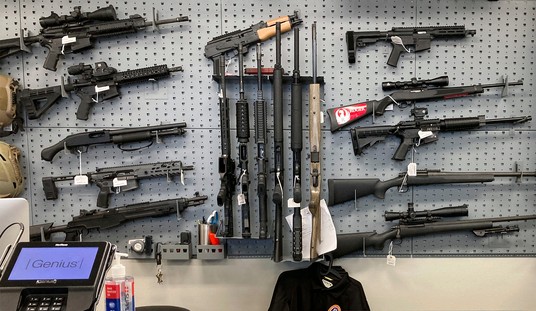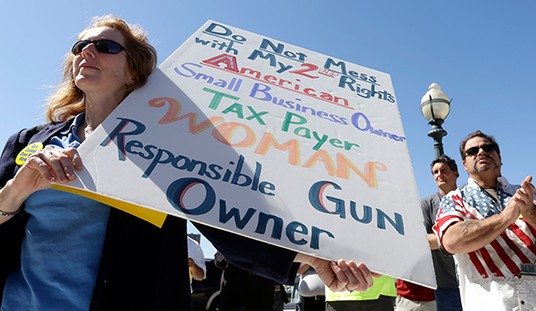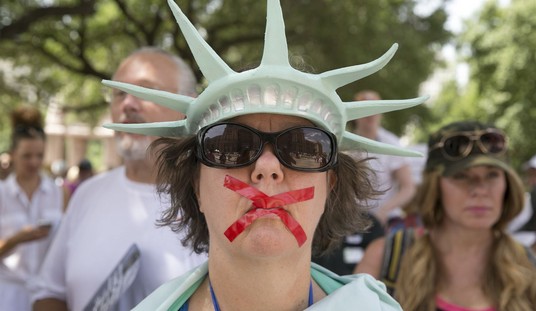A study surfaced recently that claims men cling to guns amid economic insecurity, and apparently believe that assaults on our Second Amendment rights are somehow an assault on our masculinity. I mean, this is science. This can’t be disputed, right?
Well, it may be science, but the science is never settled.
Two researchers recently found that when examining men who are going through financial problems, many of their passionate views about firearms derive from a sense of “empowerment”—and they feel stricter gun laws are an attack on their masculinity.
The study by Baylor University sociology professors Carson Mencken and Paul Froese found white men who own firearms and have lost financial stability, or think they soon will, find moral and emotional solace in their guns.
Other demographic groups, such as women and nonwhite males, don’t place as much importance on guns, the study shows. The professors also found that gun owners on average are typically white, male, married, older and living in rural areas.
“Gun control for these owners has come to represent an attack on their masculinity, independence and moral identity,” Froese said in a statement.
Froese said this belief wasn’t as prevalent in religious white men, who instead feel their guns are “sacred,” but aren’t as attached as their non-practicing counterparts.
Wow. That’s…wow. Can it be true?
I don’t know. The very next paragraph claims the study found that 90 percent of gun owners “expanded gun safety laws” which would seem to fly in the face of this claim. After all, there’s no way you can tell me white males only make up 10 percent of gun owners or anything of the sort. Further, I have a hard time finding more than a scattered handful of gun owners who think we need more infringement on our Second Amendment rights.
But is gun ownership tied to masculinity?

When gun control laws are proposed, many of us feel that it’s not so much an attack on our masculinity itself–after all, if you’re not a man without a gun, you’ll never be a man with one–but it is an attack. It’s an attack on our ability to act as men and to fill the role of our family’s protector in the most efficient manner possible. Especially since we know criminals will remain armed.
The researchers seem to give nod to this when they write:
Carlson’s (2015a, 2015b) research focuses on how the gun fits into the “protector” masculinity model, and how this model has emerged because of an economic restructuring that has eliminated or at least threatens to eliminate, the ‘breadwinner’ masculinity model. Global economic changes over the last 30 years have stressed workers’ share of earnings, leading to greater macro-level income inequality and greater economic strain on households (see Etzioni 2011; Lin and Tomaskovic-Devey 2013; Sherman 2013; Treas 2010). The economic distress of the Great Recession has negatively affected male workers more severely than in any economic downturn since 1981. According to the Displaced Worker Survey, during the Great Recession 16 percent of males lost a job, and the mean spell of unemployment was 35 weeks. Less than half of the males who lost a job during the Great Recession were working full time by January 2010. For those who lost jobs, the breadwinner masculinity model no longer works; for those who did not lose jobs, the recession still created anxiety,2 concern, or what Carlson (2015b:392) labels “precarity,” a sense of foreboding or impending economic calamity.
According to hegemonic masculinity models, the loss of breadwinner masculinity led to a rise in protector masculinity (Carlson 2015a, 2015b). The economic turmoil, coupled with the nation’s fear of terror attacks, active shooters, Amber Alerts, and other moral panics generated by the media, has led to the emergence of a narrative that our world is not as safe as it used to be (Griffin and Miller 2008; Woods 2012). Stroud (2012:218) refers to a “New War ethos” in which the ability to use protective violence is socially necessary. Males can reclaim their position at the top of the masculinity hierarchy through engaging in fantasies about being an NRA “good guy” who uses his gun to protect his family and community from the “bad guys.” The gun is the key prop used again and again in the protector narrative.
Of course, the flaw with this lies in the fact that man has always been expected to protect his family. This goes as far back as the cave days, for crying out loud.
What’s the takeaway?

Honestly, this study appears to be fairly meaningless.
Yes, we can fully expect the left to jump on this and to claim that our attachment to guns is because of some innate insecurity or something, but it’s also predicated on a poor understanding of masculinity as well.
Based on a total sample size of 1,572 respondents, it seems likely that their sample for this particular bit regarding insecurity and masculinity likely only makes up a few hundred at most. That’s a fairly small sample size when you look at the gun-owning population as a whole. That means abnormalities may accidentally creep into their result despite the researcher’s best efforts.
Couple that with theories of masculinity that pretend the past didn’t actually exist, and you have a recipe for a less than ideal presentation of reality. As a result, we need to be aware of the study and it’s claims, but we also need to be armed with the knowledge of the flaws apparent in this study.









Join the conversation as a VIP Member